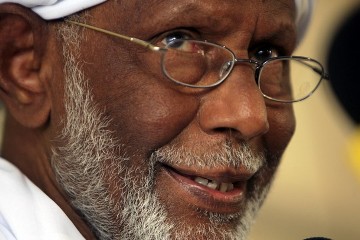Sudan’s PCP warns that national dialogue failure may prompt uprising
December 2, 2014 (KHARTOUM) – The Popular Congress Party (PCP) led by Hassan al-Turabi renewed its commitment to the national dialogue process even if elections were held as scheduled in April 2015 but warned that it would push for an uprising against the government if dialogue fails to reach its desired goal.

The PCP leader justified in a seminar held last week their acceptance of dialogue with the government on the grounds that it is the best option to address the crises of the country and avoid rupture, strife and fragmentation.
Turabi added that his party was forced to engage in dialogue and so was the government after intensified pressures and crises, declaring that opposition forces completely failed to “overthrow” the regime and are going through deep internal disputes.
The decision of the PCP to join the dialogue without preconditions led, according to well placed sources, to sharp differences between party leaders and mid-level figures who expressed reservations on the party’s decision to abandon opposition ranks and engage in dialogue.
The PCP, which shares the same Islamic origins with the ruling National Congress Party (NCP), is the only big opposition party to stick to the dialogue process.
The PCP political secretary Kamal Omer said at a press conference on Tuesday in Khartoum that his party would not hesitate to take to the streets to topple the government if dialogue fails.
He said that the ruling party decision to hold elections on time despite opposition objections is an evidence of its desire to abandon the dialogue.
Omar pointed out that the assertions of ruling party officials that they will not postpone elections do not remotely concern them adding that they “will contest alone,” pointing out that the lack of freedoms does not encourage them to participate.
However, he stressed that they will nonetheless continue engaging in dialogue even if elections took place because the country needs it” adding that the PCP will continue to advocate national dialogue in stronger ways.
He said his party entered the national dialogue according to a well thought plan for comprehensive change to all of the country’s policies including the situation of freedoms.
The PCP official rejected the idea that dialogue is meant to restore cohesion and integration with the ruling party but nonetheless said there is a plan to establish a broad Islamic Front in the future.
The PCP split from the NCP following 1999’s bitter power struggle between president Bashir and Turabi. The latter was ousted from his post as parliament speaker he was holding at the time.
Turabi afterwards established the PCP and has since been a vociferous critic of the very regime whose army-backed seizure of power in 1989 he orchestrated.
In a separate matter, Omer expressed rejection to the SPLM-N proposal of granting the regions of Blue Nile and South Kordofan self-rule calling it a road to a new secession after South Sudan’s independence in 2011.
Omer criticized the government’s dealing with the crisis in the two regions saying the current strategy will not lead to an end to the crisis, accusing the ruling party of facing a case of “political wilderness”.
(ST)
